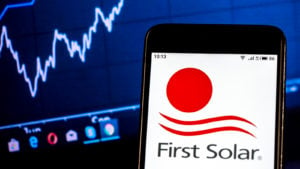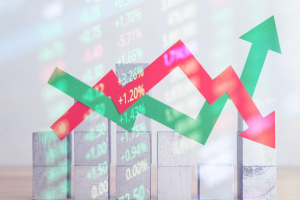
With the world fighting to go green, investors should pay close attention to some of the best renewable energy stocks to buy.
Thanks to wind and solar, about 30% of the world’s electricity was produced by renewables in 2023, with the trend only likely to strengthen. Even better for climate change fighters, the world is reaching a “crucial turning point” with clean energy, as noted by the Global Electricity Review, as noted by CNN.
The report also says “global fossil fuel generation will fall slightly in 2024, before experiencing much bigger declines in subsequent years. It’s a significant step toward the world reaching 60% renewable electricity by 2030, which is critical to meeting global climate goals, said Dave Jones, global insights director at Ember,” as noted by CNN.com.
That being said, it’s a good idea to jump into some of the best renewable energy stocks to buy. Not only does that include solar and wind, but it also includes nuclear energy, which we’ll touch on.
Cameco (CCJ)

Since bottoming out at around $40, Cameco (NYSE:CCJ) is now up to $52.23 on several big catalysts. For one, uranium is still facing supply-demand issues.
Two, there’s no net zero without uranium. As I noted on Feb. 3, “Nuclear energy operates emission-free, mitigating carbon dioxide and curbing harmful air pollutants. It’s not just an alternative; it is pivotal to global clean, sustainable energy transition–the key for net zero emissions,” according to CarbonCredits.com.”
Cameco is also racing higher on news Congress passed the Russian uranium import ban, which now unlocks about $2.7 billion to expand U.S. nuclear fuel production, says UtilityDive.com.
In addition, “The Russia ban is a big deal. It will shape the nuclear fuel markets for many years to come,” added Jonathan Hinze, president of nuclear market analysis firm UxC, as quoted by MarketWatch.com.
With those catalysts, I’d like to see Cameco closer to $60 a share near term. Longer term, I’d like to see it closer to $70.
First Solar (FSLR)

The last time I mentioned First Solar (NASDAQ:FSLR), it traded at around $164 a share on April 3. Today, it’s up to $193.61, where it is looking a bit overbought. If you’re thinking of buying FSLR, wait for it to put in a healthy pullback first.
Goldman Sachs likes it, noting the company is poised for growth with improving demand, especially with explosive data center electricity demand.
With that catalyst, the firm raised its price target to $268, noting, “As the demand picture continues to improve, management discussed the potential for adding incremental factories, which we view as a key catalyst,” as quoted by CNBC.
Wells Fargo also upgraded the solar stock to overweight, with a $250 price target, citing catalysts such as President Joe Biden’s tariff exemptions for bifacial modules, and possible U.S. trade barriers on Chinese solar panels.
First Solar earnings have been strong, with first-quarter earnings per share of $2.20 beating by 22 cents. Revenue of $794 million – up 44.8% year over year – beat by $71.9 million.
First Trust NASDAQ Clean Edge Green Energy Index Fund (QCLN)

We can also jump into rebounding shares of the exchange-traded fund (ETF), First Trust NASDAQ Clean Edge Green Energy Index Fund (NASDAQ:QCLN).
Since bottoming out at around $30 in late May, the ETF ran to a recent high of $35. Now at $34.68, it’s still a strong buy opportunity. With an expense ratio of 0.58%, it holds 56 green energy stocks, which you can see here.
Top holdings on the list include First Solar, Enphase Energy (NASDAQ:ENPH), Albemarle (NYSE:ALB), Tesla (NASDAQ:TSLA) and Brookfield Renewable (NYSE:BEP) to name just a few.
To be included in the fund, a stock must fall in the category of Advanced Materials, including nanotech, membranes, silicon, lithium, carbon capture; Energy Intelligence, including conservation, energy management systems, smart grid, superconductors and power controls; Renewable Electricity Generation & Renewable Fuels, including solar photovoltaics, concentrating solar, wind, geothermal and ethanol; and Energy Storage & Conversion, which includes advanced batteries, hybrid drivetrains, hydrogen, fuel cells for stationary, portable and transportation applications, as noted by First Trust.
What’s nice about an ETF like QCLN is we can own more for less. QCLN last traded at $34.68 and allows us to diversify with 56 green holdings.
On the date of publication, Ian Cooper did not hold (either directly or indirectly) any positions in the securities mentioned. The opinions expressed in this article are those of the writer, subject to the InvestorPlace.com Publishing Guidelines.






